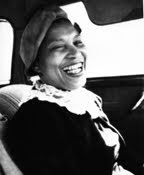 Five years ago, Halle Berry stepped into the very large shoes of Janie Crawford in an exploration of self-worth, love, and independence as they might lead to fulfillment more than community conformity, familiar obedience, and fiscal security. But Crawford in Their Eyes Were Watching God proved to be best played with modest grace than mere wanting.
Five years ago, Halle Berry stepped into the very large shoes of Janie Crawford in an exploration of self-worth, love, and independence as they might lead to fulfillment more than community conformity, familiar obedience, and fiscal security. But Crawford in Their Eyes Were Watching God proved to be best played with modest grace than mere wanting. That is why, as a television movie, the pedestrian treatment never measured up to the original story. The work relies heavily on the confessional thoughts and internalized experiences of an African-American woman living in the 1920s.
It is an extraordinary book, well ahead of its time, in its contrast between Crawford's relationships with three different men, each of whom provides an environment that results in three different lifestyles.
Her first marriage, arranged by her grandmother, is to an older man who needs a wife to keep his home and help on the farm. Her second, while filled with promise during the courtship, turns sour as her new husband believes his conquest ought to earn him an empty-headed trophy wife to reinforce his powerful position in town. And finally, the third, which despite Tea Cake's imperfections, proves mutually rewarding, even if it is doomed from the beginning.
About Author Zora Neale Hurston.
Hurston became a pre-eminent American writer during the Harlem Renaissance, traveling as an anthropologist in the Caribbean and American South to better understand their cultural practices. At the same time, beginning in college, Hurston published several short stories before writing her first novel in 1934 and first "literary anthropology" in 1935.
 Her master work, Their Eyes Were Watching God, was published in 1937. She wrote it while conducting field work in Haiti.
Her master work, Their Eyes Were Watching God, was published in 1937. She wrote it while conducting field work in Haiti. The novel was considered controversial for the era and remains so today. In addition to her use of the dialect spoken by blacks in the 1920s South, friends and associates who were part of the Harlem Renaissance took exception to the divisions between lighter and darker skinned African-Americans and unbalanced gender roles.
“So de white man throw down de load and tell de nigger man tuh pick it up. He pick it up because he have to, but he don’t tote it. He hand it to his womenfolks. De nigger woman is de mule un de world so fur as Ah can see.” — Hurston in Their Eyes Were Watching God
These controversies, along with her political views, regulated Hurston's work to near obscurity until 1975. Among her insights, she believed that economic support would create harmful dependencies with the government and that desegregation in schools would not lead to a better education but eventually diminish a richness of cultural tradition.
While the phonetic spellings within the dialogue can be taxing while reading Their Eyes Were Watching God, it also forces readers to consider the full measure of every word. Once they do, the authenticity carries a remarkable message that resonates long after the last page is turned and the cover is closed.
As an alternative, legendary actress Ruby Dee provides the narration for the audiobook produced in 2004. It requires careful listening in the opening chapters, but eventually embraces the listener with its warmth. While best known for her role in A Raisin in the Sun (1961), Dee was recently nominated for an Academy Award for her role in American Gangster (2007).
Their Eyes Were Watching God By Zora Neale Hurston Flies To 9.6 On The Liquid Hip Richter Scale
Their Eyes Were Watching God raises the same arguments being made today, except those being made today are often without concern for race and gender. Hurston, like her heroine Crawford, would likely speak out against the unequal trade being offered today, especially given her own life experiences. She had the ability to find happiness despite life's uncertainties, which exist whether or not men and women make provisions and sign contracts to prevent them. She would rather live free.
Their Eyes Were Watching God is available on Amazon. The audiobook, read by Dee, can be found on iTunes. To learn more about this important author, visit the Zora Neale Hurston website. Last March, Harper Perennial secured the rights to continue publishing the Harlem Renaissance writer for the next decade.
![Liquid [Hip]](https://blogger.googleusercontent.com/img/b/R29vZ2xl/AVvXsEjAFBQPqS7J0-rrttNoRYSsuwIePPZf4Nq6sqDioK1zzVQXJIQXKzq_NVNI4n6h3inuRQFBKOcJeZeSufkdHHIOxbSWyBjTjTxgKEQGyPzdwvkEEeECh4bI5YEGk4RWGUINSd7vulPQsCA/s1600-r/liquidhip.jpg)